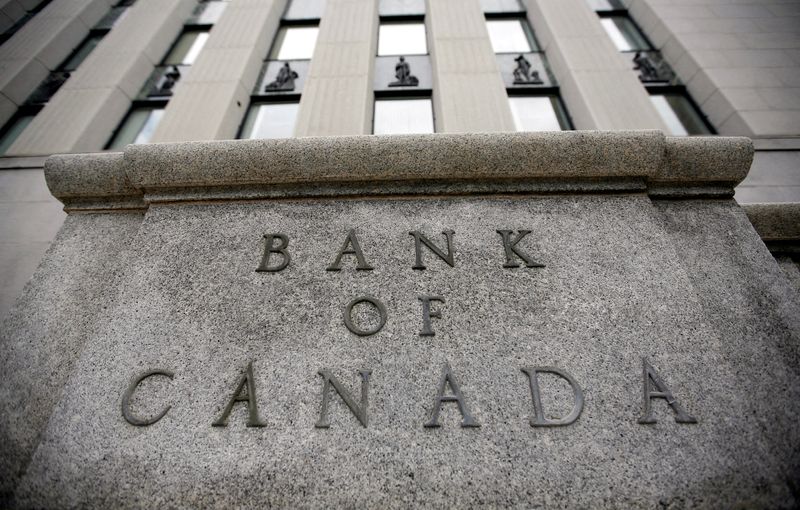By Fergal Smith
TORONTO (Reuters) - The Bank of Canada would be willing to cut interest rates three times ahead of the Federal Reserve's first move before a declining currency threatens to endanger the inflation outlook, the median estimate of seven analysts in a straw poll showed.
A weaker Canadian dollar versus the greenback this year has sparked debate among investors about how much the BoC would be prepared to diverge from its U.S. counterpart.
Investors expect the Canadian central bank to begin rate cuts in June or July, with next Tuesday's inflation reading seen as a key input. But the Fed is seen on hold until September, even after cooler-than-expected U.S. inflation data on Wednesday.
The BoC's benchmark interest rate, at 5%, already sits 38 basis points below the midpoint of the range set by the Fed for its policy rate. Further widening in the differential could add to pressure on the loonie.
Still, analysts say it would take a large move in the currency to drive up import costs enough to put at risk the central bank's efforts to lower inflation to a 2% target.
A higher cost of imported goods tends to raise the prices that businesses charge to consumers.
"Although there's a theoretical limit to how far the Bank of Canada can set its own policy rate beneath the Fed funds rate, it's likely well below current levels," said Karl Schamotta, chief market strategist at Corpay.
"The exchange rate could weaken if interest differentials were to widen further ... but the passthrough to inflation should be relatively modest."
The latest data shows inflation at an annual rate of 2.9% in March, down from an 8.1% peak in June 2022.
The Canadian dollar has already weakened nearly 3% against its U.S. counterpart since the start of the year, to 1.3640 per U.S. dollar, or 73.31 U.S. cents, as the greenback climbed against a basket of major currencies.
"As a rule of thumb, a 10% fall in the loonie would boost core goods prices by 2.5%," Olivia Cross, North America economist at Capital Economics, said in a note, adding that core goods make up about 30% of the Canadian CPI basket.
There is a limit to how far U.S. and Canadian interest rates can diverge, but "certainly we're not close to that limit," Bank of Canada Governor Tiff Macklem said earlier this month.
The Canadian economy has lagged the U.S. economy in recent quarters, weighed by weaker productivity growth as well as higher levels of household debt and a shorter mortgage cycle, a factor some economists argue should see the BoC move ahead of the Fed.
The OECD projects Canada's economy will grow 1% this year, much less than the 2.6% rate it forecasts for the United States.

The interest rate gap has stayed within 100 basis points since the global financial crisis of 2008-09. Still, that level may not be a binding constraint if the Canadian outlook deteriorates over the second half of 2024, said Robert Both, a senior macro strategist at TD Securities.
"A larger-than-expected drag on the household sector from mortgage renewals could give the Bank more license to diverge from the Fed," Both said.